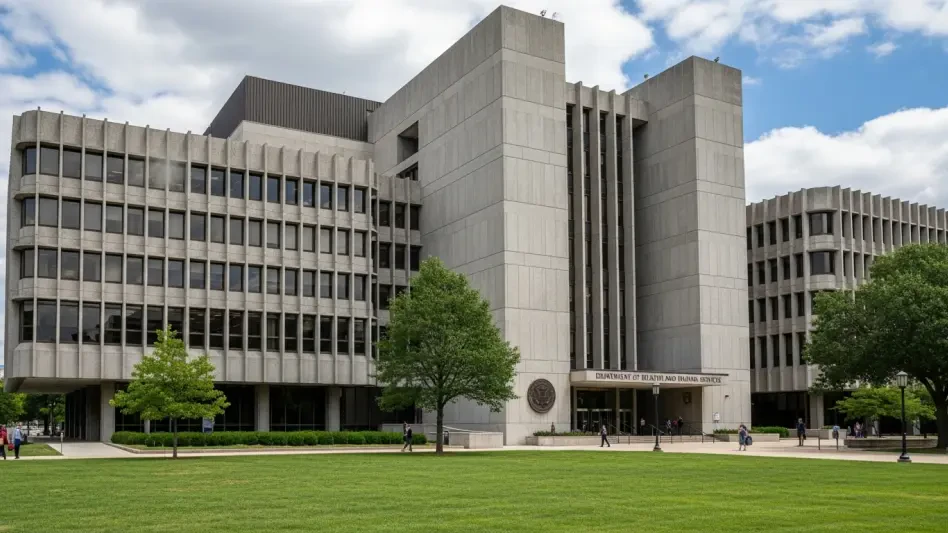What happens when a cornerstone of American healthcare, designed to protect the most vulnerable, becomes a weapon in the fight against undocumented immigration? Under the Trump administration, a seismic shift is unfolding as the Department of Health and Human Services (HHS) transforms state Medicaid programs into tools for identifying those without legal status, creating a policy that could strip healthcare from thousands and redefine a safety net that has stood for over six decades. This policy, driven by a directive from the Centers for Medicare & Medicaid Services (CMS), isn’t just a bureaucratic footnote—it’s a deliberate move with high stakes, already stirring heated debates across the nation about access, fairness, and the intersection of health and politics.
The importance of this story lies in its profound impact on millions who rely on Medicaid, a joint state-federal program with spending surpassing $900 billion this year. As immigration enforcement tightens under the current administration, this HHS mandate forces states to scrutinize the immigration status of enrollees, risking coverage losses not only for undocumented individuals but also for lawful residents caught in administrative crossfire. This isn’t merely a policy update; it’s a collision of healthcare access and federal immigration priorities, raising critical questions about who deserves care in America and how far the government will go to enforce borders through social programs.
A Policy Shift That Hits Close to Home
At the heart of this controversy is a directive that reimagines Medicaid’s purpose, turning it from a lifeline into a checkpoint for immigration status. Issued by HHS through CMS, the policy compels state agencies to investigate specific enrollees flagged as potentially ineligible due to their legal standing. This move marks a stark departure from Medicaid’s traditional role as a healthcare safety net, igniting concerns among advocates that it prioritizes enforcement over healing.
The immediate impact is felt in communities where fear of exposure now overshadows the need for medical care. Families, already struggling with poverty, face the added burden of proving their eligibility under intensified scrutiny. In states like Texas and Colorado, local clinics report a chilling effect—patients avoiding routine checkups or emergency care due to rumors of data-sharing with immigration authorities, even though such practices were halted by a federal judge last year.
This shift also strains state resources, redirecting funds and personnel from patient care to compliance with federal mandates. As the policy unfolds, it’s becoming clear that the implications extend beyond individual enrollees to the very structure of public health programs, challenging the balance between state autonomy and federal oversight in a deeply polarized landscape.
Why This Matters: Healthcare, Immigration, and Politics Collide
Medicaid serves as a critical support for low-income and disabled individuals, yet it now finds itself at the epicenter of a political storm. The Trump administration’s hardline stance on immigration has seeped into healthcare policy, with the CMS mandate aligning with broader efforts to restrict benefits for those without legal status. This intersection of health and border control is reshaping access for millions, as the fear of deportation looms over doctor’s visits.
Beyond the human toll, the policy exposes a growing rift between federal intentions and state realities. States are caught between complying with CMS orders and protecting their residents, many of whom are lawful but vulnerable to bureaucratic errors. The tension is palpable—healthcare, once a bipartisan priority, is now a battleground where immigration politics dictates who gets help and who gets turned away.
This collision also raises ethical dilemmas about the role of public programs in enforcement agendas. With over 170,000 individuals targeted for review across multiple states, the risk of wrongful disenrollment looms large, threatening not just undocumented immigrants but also citizens and legal residents who may lack the means to navigate complex paperwork demands. The stakes couldn’t be higher as this policy tests the limits of compassion in governance.
Breaking Down the Directive: What’s Happening and Who’s Affected
The HHS directive is multifaceted, with each component carrying significant consequences for states and enrollees alike. CMS has instructed state Medicaid programs to examine the immigration status of over 170,000 individuals across five states—Colorado, Ohio, Pennsylvania, Texas, and Utah—as of recent reports. This federal push is framed as a crackdown on ineligibility, but it’s met with skepticism about its necessity and scope.
Financial disputes further complicate the landscape, with CMS Administrator Mehmet Oz claiming over $1 billion in federal funds were misspent on undocumented immigrants in select regions. State officials, however, challenge these figures—Colorado’s Marc Williams, for instance, dismissed reported numbers as inaccurate, highlighting a lack of clarity on the timeframe or evidence behind federal assertions. This disagreement underscores deeper issues of trust and accountability between levels of government.
Critics also point to legal and practical flaws, noting that undocumented individuals are already largely ineligible for federally funded Medicaid, except for emergency care like childbirth. The added scrutiny risks wasting resources on redundant checks while potentially disenrolling eligible people due to missed notifications or paperwork errors, as warned by health policy expert Marian Jarlenski from the University of Pittsburgh. Tied to broader initiatives like data-sharing with Homeland Security (currently blocked) and new eligibility rules set for 2025 to 2027, this directive signals a systemic tightening of access that could reshape public health for years.
Voices from the Ground: Critics, Officials, and Experts Weigh In
The response to this policy is a chorus of contention, with diverse stakeholders voicing sharp disagreement. CMS Administrator Mehmet Oz has taken to social media platforms like X to defend the mandate, arguing that states must be held accountable for alleged misuse of taxpayer money and questioning whether such oversights would persist without federal intervention. His stance frames the issue as a fiscal imperative, resonating with supporters of stricter immigration controls.
State officials, however, offer a starkly different narrative. Illinois’ Melissa Kula has accused the administration of peddling misinformation, while Washington, D.C.’s Melisa Byrd clarified that a $654,014 repayment stemmed from billing mistakes, not immigration-related fraud. These rebuttals suggest a policy driven more by political motives than by evidence of widespread abuse, fueling frustration among state leaders tasked with implementation.
Advocates and academics add another layer of critique, emphasizing the human cost. Ben D’Avanzo from the National Immigration Law Center labeled the mandate a redundant anti-immigrant tactic, while Georgetown University’s Leonardo Cuello called the reviews “pointless,” citing database errors like misspellings as the likely source of discrepancies. Together, these voices paint a picture of a policy mired in controversy, where the pursuit of enforcement may overshadow the needs of the vulnerable it claims to protect.
Navigating the Fallout: What Can Be Done?
Amid the uncertainty, actionable steps emerge for states, communities, and advocates to lessen the policy’s harm. States can resist federal overreach by presenting data to counter exaggerated claims, as seen in Colorado and Washington, while ensuring clear communication with enrollees to prevent unnecessary coverage losses. This dual approach aims to protect both administrative integrity and individual rights under immense pressure.
Community organizations play a vital role by stepping in with legal aid and translation services, helping lawful residents navigate the maze of reverification demands. Such support is crucial for those at risk of losing benefits due to language barriers or unfamiliarity with bureaucratic processes, ensuring that eligibility isn’t sacrificed to procedural missteps.
Public education also stands as a powerful tool, informing communities about their rights under Medicaid, particularly emergency care provisions for undocumented individuals. By reducing fear and confusion, awareness campaigns can encourage continued access to essential services. Meanwhile, stakeholders must monitor the policy’s impact, collecting data to challenge disproportionate effects on marginalized groups and push for reforms grounded in evidence rather than rhetoric. These efforts collectively strive to preserve healthcare access amid a contentious federal agenda.
As this policy debate unfolded, it became evident that the intersection of healthcare and immigration enforcement had sparked profound challenges for vulnerable populations. Looking back, the lessons learned pointed toward a need for balanced solutions that prioritized access over exclusion. Moving forward, states and advocates must continue to champion transparent data and robust legal protections to shield eligible individuals from administrative fallout. Additionally, fostering dialogue between federal and state entities could pave the way for policies rooted in factual need rather than political intent, ensuring that Medicaid remains a safety net, not a snare, for those most in need.









